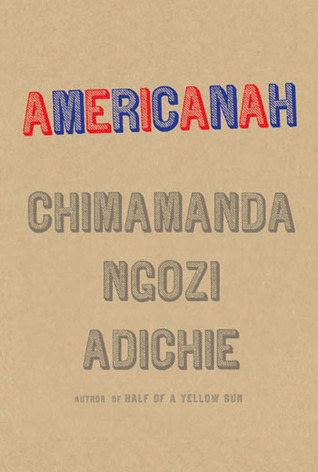
I've now read two Chimamanda Adichie novels in the last month or so. Before that, she was an author entirely new to me. I'm now in an awkward position where I liked this book a lot better than Half of a Yellow Sun, on a level of pure enjoyment, but probably think Half of a Yellow Sun is a more important book.
The comparison that occurs is with Tolstoy. Bear with me. I slogged my way through War and Peace, and although I recognized it was an Important Book in every sense of the word, it's hard to say I enjoyed the process of reading it. Then I read Anna Karenina, and enjoyed it so much more. It was all of the society stuff I had enjoyed about War and Peace without the long sections on war, which I found boring.
That is pretty much what's happening here. Half of a Yellow Sun was a similarly Important Book (capitalization and all), but I found the sections on war between Biafra and Nigeria draining and difficult. It felt like a book I had to read, but also one that I found difficult to relish. I don't do well when books deal with brutality in detail, even though I fully acknowledge such things happen, and should be grappled with.
But when I opened this book, and it was apparent it wasn't going to be about war in the same way, I relaxed and enjoyed myself a whole lot more. Which may be a little odd, given that a lot of this book is about race and identity and the difficult intersections between nationality, perceived racial identity and recent North American society juxtaposed with Nigeria.
Honestly, though, this is what I'm eager to read about, and Adichie is merciless in dragging out issues of race in ways that delve into the complexity of racial identities that may be presumed to be universal, but are also nationally dependent. The main character, Ifemelu, moves from Nigeria to the United States, and writes a very success blog about being a non-American Black woman in the U.S. There is some really interesting stuff here about her becoming aware of race in a new way, even while she struggles to understand some of the coded racism that goes on around her, racism to which her American Black friends are keenly attuned and expect her to pick up on in the same way they do.
Her high school love moves to England for a while, and we get that experience as well, and the sections were Ifemelu and Obinze both struggle with staying afloat in a world that doesn't want to hire them are difficult. We also get their moves back to Nigeria, and how both the country and they have changed while they were away. The difficulties of expatriate life, and returned expatriate life are intertwined with a personal story of two people whose own tale is far from finished.
The book centres around difference, both that created and reinforced by societies, and that we create ourselves. Ifemelu thinks herself flexible, an outsider's view that lets her see American society through eyes that are and are not Black, that see race from a different perspective. But when she moves home, she finds that she has also carried assumptions about what Nigeria is like that make her life there startling, make her most at home with other Nigerians who have lived abroad and come back.
It is not that there is no common ground, but there is a good deal about the underlying assumptions, the ones we don't even think about. The ones we expect others to know without ever realizing how they come from cultural conditioning.
And all of this is wrapped around Ifemelu's story, and made extraordinarily personal. It's a less urgent book than Half of a Yellow Sun, but Americanah is one I'd have an easier time coming back to.
It is not that there is no common ground, but there is a good deal about the underlying assumptions, the ones we don't even think about. The ones we expect others to know without ever realizing how they come from cultural conditioning.
And all of this is wrapped around Ifemelu's story, and made extraordinarily personal. It's a less urgent book than Half of a Yellow Sun, but Americanah is one I'd have an easier time coming back to.
No comments:
Post a Comment